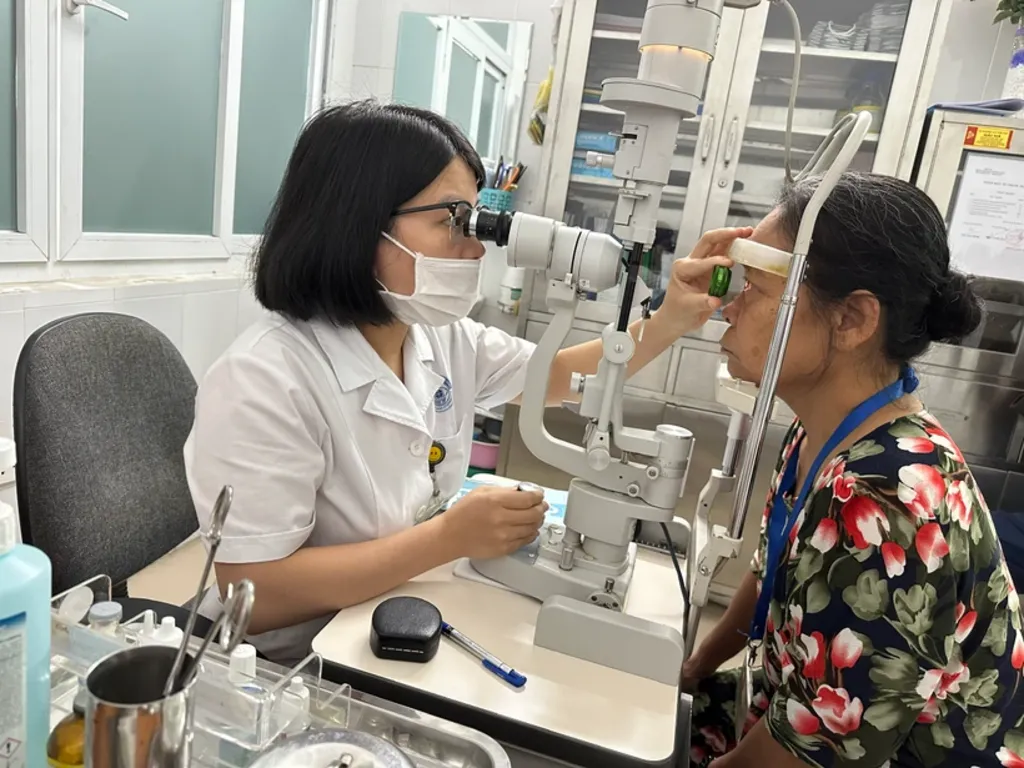 |
| A doctor from the Central Eye Hospital examines a patient__Photo: VNA |
Public-private partnerships must be strengthened in both education and training and public healthcare, as emphasized by the Prime Minister at the recent meeting of the Government’s Party Committee. The meeting was held to review and provide feedback on two draft Politburo resolutions, one focused on the modernization and breakthrough development of education and training, and the other on advancing public healthcare to meet the country’s development needs in the new era.
Roadmap toward free hospital services and modernized healthcare
The draft resolution on public healthcare proposes a roadmap for gradually eliminating hospital charges for citizens, expanding access to regular health checkups, ensuring vaccine supply and immunization coverage, and improving the availability of medicines and medical equipment. It also aims to enhance the quality of medical services and effectively apply scientific and technological advances.
To achieve these goals, the draft outlines several key measures. These include reforming leadership and organizational approaches in public healthcare, strengthening the health system, particularly in preventive medicine, grassroots healthcare and traditional medicine, and developing high-quality human resources through special incentive policies.
The draft also calls for accelerating financial reform in the healthcare sector, making breakthroughs in scientific and technological development, fostering innovation and digital transformation, and promoting private healthcare to mobilize all available resources.
At the meeting, the Government leader urged the drafter to improve the draft resolution with a focus on shifting from treatment-centered care to a model that prioritizes the protection and promotion of public health. He stressed that public health care must be regarded as fundamental, strategic, and long-term, while treatment should be seen as a regular and responsive function.
The draft also needs to be designed toward organizing healthcare through two-tier local administration structures to ensure equal access to services, especially in remote, deep-lying, border, island, and ethnic minority areas. It will also highlight the importance of strengthening preventive and grassroots healthcare, improving the physical well-being of Vietnamese citizens, addressing population aging, and developing the pharmaceutical and vaccine industries.
The Prime Minister emphasized that a clear roadmap must be established for the provision of free hospital services without delay, starting with medical care for children.
Improving education and training quality, with a focus on emerging sectors
The draft resolution on education and training aims to expand equitable access to education; comprehensively improve educational quality; reform vocational training to enhance workforce skills; modernize higher education; and develop high-quality human resources and technological talents to promote research and innovation.
It also proposes breakthrough measures to enhance state management and unlock the potential and creativity of the sector. These include reforming financial policies to improve the efficiency of state budget use and encouraging greater engagement from the non-public sector.
Commenting on the draft, the Prime Minister requested that the draft resolution should clearly define the governing scope, covering general education, vocational training, higher education, and postgraduate studies, with key emphasis placed on each level.
For general education, he underscored the need to ensure equitable access, especially in remote and underserved areas. He also called for a specific roadmap for universalization of foreign-language teaching, particularly English, and the development of programs in cultural, artistic, aesthetic, and physical education to foster well-rounded student development.
In the area of vocational education, the Premier stressed the importance of streamlining training programs and improving skill levels to meet domestic economic needs and support labor export. Meanwhile, for higher education, he emphasized the need for breakthroughs in both quality and scale, with a particular focus on emerging disciplines.
The Prime Minister also called for the development of talent training programs, the building of a qualified teaching workforce, and the review and categorization of educational institutions to ensure targeted and effective investment.- (VLLF)









